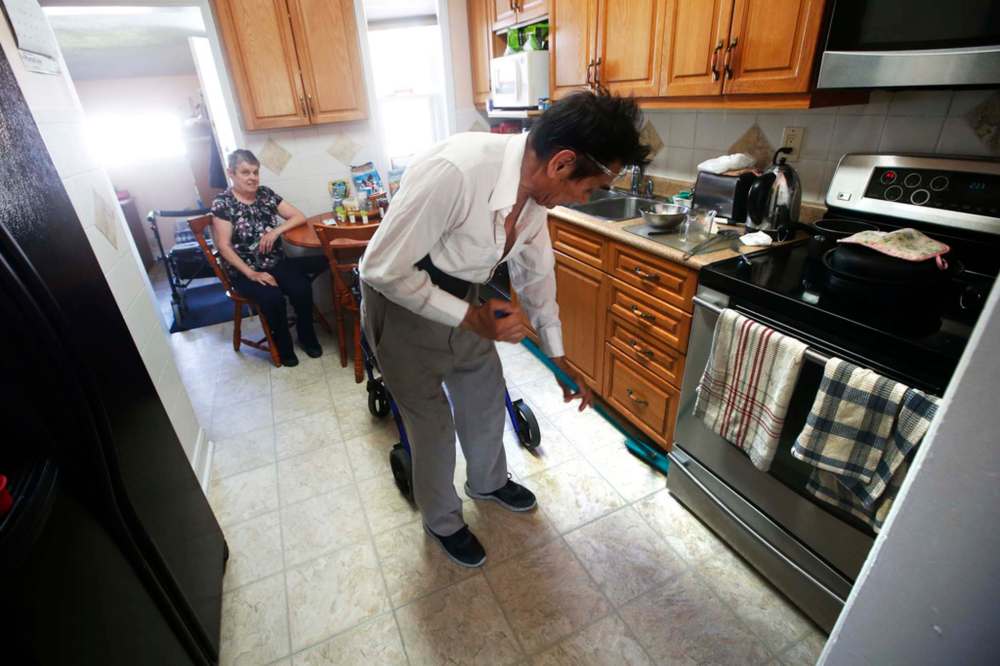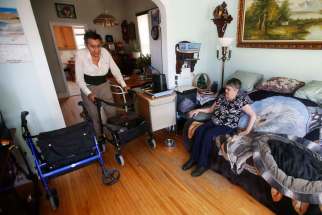‘It’s a living hell’ Seniors struggle to manage while waiting for resumption of home-care service
Read this article for free:
or
Already have an account? Log in here »
To continue reading, please subscribe:
Monthly Digital Subscription
$19 $0 for the first 4 weeks*
- Enjoy unlimited reading on winnipegfreepress.com
- Read the E-Edition, our digital replica newspaper
- Access News Break, our award-winning app
- Play interactive puzzles
*No charge for 4 weeks then billed as $19 every four weeks (new subscribers and qualified returning subscribers only). Cancel anytime.
Read unlimited articles for free today:
or
Already have an account? Log in here »
Hey there, time traveller!
This article was published 01/06/2020 (1421 days ago), so information in it may no longer be current.
A few days after Mary-Lou Pakoo learned the home-care services she relies on would be cancelled, the 71-year-old senior was rushed to hospital for brain surgery.
Even before the emergency stay in April, where medical staff cleared a shunt in her brain that relieves pressure caused by a tumour, Mary-Lou and her husband Lloyd wondered how they would manage without the weekly visit from their home-care worker.
“I told them straight. Look, you can’t send her home. There’s nothing in place for her and I can’t handle it,” said Lloyd, 77, recalling his conversation with the hospital nurse. “I’ve got a very bad back, I’ve got an artificial knee and it’s just too much for me.”

The couple lives at their home in Winnipeg’s North End and, prior to the COVID-19 pandemic, a health-care aide visited the Pakoos for two hours a week, handling the laundry, housecleaning and providing baths.
In April, the Winnipeg Regional Health Authority temporarily suspended some home-care services for clients based on priority. Bathing, laundry, respite and other services considered non-essential were reduced or cancelled indefinitely. Clients were assessed on a case-by-case basis, and where possible backup care providers were asked to fill in the gaps. For the Pakoos, they were backup for each other.
Lloyd successfully advocated for bathing to resume once a week after Mary-Lou — who struggles with her balance — was discharged from hospital. However, he was not able to get cleaning or laundry restored. He said weekly calls to their care co-ordinator haven’t amounted to much.
“I told them straight. Look, you can’t send her home. There’s nothing in place for her and I can’t handle it. I’ve got a very bad back, I’ve got an artificial knee and it’s just too much for me.”
– Lloyd Pakoo, 77
He’s taken over the housework with great difficulty — he manages to sweep the floor while holding on to his walker — but after two months without regular home care and no timeline for when services will resume, the added burdens are becoming impossible, Lloyd said.
“It’s a living hell, in plain words. I’m trying to keep everything going,” Lloyd said. “I have to make sure that she’s all looked after before I go to sleep and that’s very difficult for me.”
The service reduction was attributed to staffing and personal protective equipment challenges related to the pandemic response and as a way to minimize the risk of transmitting the coronavirus.
Home-care services for seasonal residents in eastern Manitoba limited
Cottagers and summer residents in the Interlake-Eastern Regional Health Authority may not be able to accesss home-care services owing to the COVID-19 pandemic.
The Interlake-Eastern Regional Health Authority said home-care staff in the area have been shifted to support requirements under the Public Health Act and the province’s pandemic response and the home care program in the region is only now starting to resume services.
Cottagers and summer residents in the Interlake-Eastern Regional Health Authority may not be able to accesss home-care services owing to the COVID-19 pandemic.
The Interlake-Eastern Regional Health Authority said home-care staff in the area have been shifted to support requirements under the Public Health Act and the province’s pandemic response and the home care program in the region is only now starting to resume services.
“This summer, our focus is on the resumption of priority services for permanent residents as we move into the next phase of our response to the pandemic,” Interlake-Eastern RHA chief executive officer Ron Van Denakker said in a statement. “Once those services are up and running, we will be in a position to consider operational ability to support care for seasonal residents where possible.”
Home-care case co-ordinators will consider requests from seasonal residents on a case-by-case basis but they will not be able to accommodate everyone, according to a news release. If home-care services are provided, they may not be at the same level of care or service provided in prior years.
Manitobans who travel to summer residences are asked to arrange their own care if the health authority cannot offer services.
While the province’s supply of personal protective equipment has since stabilized, the COVID-19 caseload remains low, and acute care and personal care homes are relaxing some visitor restrictions, the WRHA has yet to set a date to restore home-care services.
“As we continue to navigate the current pandemic, home care program leadership has been working on a clinical restart plan, which will factor in the safety and security of clients, caregivers and staff, which is the utmost priority,” a WRHA spokesman said in a statement to the Free Press. “The plan for the Winnipeg region specifically is nearing its final stages of development, and will soon be considered as part of an overall provincewide approach.”
“The modification of services was originally intended to mitigate transmission, to conserve PPE and to prioritize staff time; and these remain important factors to consider. Any plans to move forward need to consider these multiple factors prior to implementation.”
Canadian Union of Public Employees Local 204 president Debbie Boissonneault said a number of home-care support workers and aides have been pulled away from their regular clients to assist with cleaning in primary care clinics, COVID-19 screening at hospitals and testing sites, and to wash medical gowns.
Meanwhile, others have told the union they sometimes spend a portion of their shift without an assignment while colleagues are still balancing a full client list, Boissonneault said.
“It’s a living hell, in plain words. I’m trying to keep everything going. I have to make sure that she’s all looked after before I go to sleep and that’s very difficult for me.”
– Lloyd Pakoo
“If they have an eight-hour window… they could be sitting four hours ‘in-house’ (at Access centres) or in their car,” Boissonneault said. “I believe they need the work and they’re wanting to do the work. The employer not providing work makes for a long day.”
The WRHA spokesman said while staff availability was considered as part of its decision to temporarily reduce services, the health authority was also focused on conserving protective gear and limiting contacts between staff and clients, when safe to do so.
There have not been a lot of reassignments of home-care staff for COVID-19-related duties, he added.
“Case co-ordinators have been reaching out to clients on weekly, biweekly and monthly basis, depending on client preference, in order to touch base and discuss how they are managing,” the spokesperson said. “We continue to encourage clients and caregivers to connect with their home-care case co-ordinator to discuss their own circumstances, particularly if there has been a change in circumstances.”
Mary-Lou, meanwhile, worries the longer her home care is on the back burner the more her health and that of her husband’s will suffer.
“They cut the services and I can’t do nothing. My husband does it all for me and he can’t do it anymore,” Mary-Lou said. “We need the home care for sure.”
danielle.dasilva@freepress.mb.ca

Danielle Da Silva
Reporter
Danielle Da Silva was a general assignment reporter for the Free Press.
History
Updated on Tuesday, June 2, 2020 9:50 PM CDT: Fixes typo in sidebar







